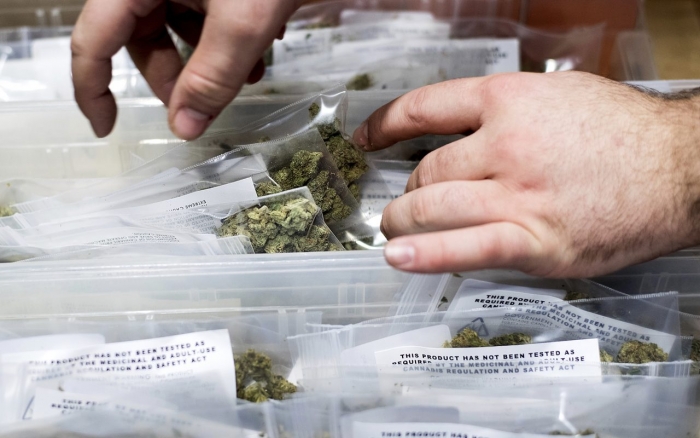The morning after Kenny Morrison brought his wife and their new baby son home from the hospital, he found out he’d been burglarized.
It was the middle of January, and a team of six had broken into his Bay Area facility, smashing delivery truck windshields, computers and a safe, and walking away with hundreds of thousands of dollars worth of cash and inventory.
Morrison owns one of the oldest and most successful marijuana-infused products companies in the country, putting out popular edibles like the 4:20 Bar and Cannabis Quenchers in both California and Washington state.
The day after the break-in, he was furious, but he wasn’t that surprised. After all, when the bank won’t take your cash, and state posts your address online, it’s pretty easy for any thief with Internet access to plan an epic heist.
Twelve weeks after California began legal sales of adult-use marijuana, newly licensed operators like Morrison are finding themselves more vulnerable to crime than ever before.
Because cannabis remains illegal under federal law, banks generally won’t accept the money made by pot businesses, forcing entrepreneurs like Morrison to keep huge amounts of cash on hand. For a long time, Morrison dealt with this problem quietly.
But now that he is licensed to distribute marijuana by the state of California, he is subject to standard public records disclosure laws. So all of his information is easily searchable on a government database – including the exact location of his business.
“We carry more cash than banks. You can’t walk into a bank and get $300,000 in cash if you want it. You’d make more money robbing one of us,” Morrison says. “It just felt like, wow, now that my business is completely legal, it’s never been more dangerous.”Every state that has legalized weed has struggled with whether to make information about cannabis businesses public. In some places, the weed industry has successfully lobbied to keep their addresses and names private. In others, all of the details are accessible on a government website. Business owners have adjusted accordingly.
“At a regulatory level and a legislative level, ultimately they are forcing us into very high security buildings with protocols that would match a nuclear facility,” says Ryan Cook, the COO of the The Clinic, a cannabis dispensary chain with operations in Colorado and Illinois. “At the end of the day the location of our facilities is information we would rather not have released, but you have to accept the fact that this is part of the cost of doing business in the cannabis industry.”
That may be the case for states that have now had regulated sales for several years. But in California right now, the risks facing legal businesses seem to be compounding, creating what Morrison described as “a perfect shitstorm.”
For starters, California is by far the biggest marijuana market in the world, meaning there is a lot more money at play. Green Wave Advisors estimates the total size of the Cali market is about $15 billion – over ten times bigger than the market in Colorado.
To make matters worse, only a very small percentage of marijuana businesses in California are legal, meaning there aren’t even that many names and locations for a potential thief to peruse in the state’s database of licensed operators.
In pot epicenters like Los Angeles and northern California’s Humboldt County, the bureaucrats doing the licensing are severely backlogged and understaffed. Many cities and counties don’t even offer the permits that would allow local businesses to become legal.
As of mid-March, illegal storefront marijuana dispensaries outnumber legal storefront marijuana dispensaries at least seven to one, state-wide. That means that most of the pot shops that you see in California – even the ones that scan your driver’s license and seem to be legal – are technically not legal.
In order to sell product directly to the legal stores, licensed growers and manufacturers like Morrison need to additionally have a distribution license. Distributors are the ones who collect tax to pay to the state, which they can only do on a quarterly basis.
At last count, only 247 companies had received temporary licenses for the adult-use distribution of marijuana in California. That means that 247 companies are currently holding on to the bulk of the state’s marijuana excise tax dollars – in cash. And the addresses for all of those companies are online. Searchable by city, Available for anyone to find.
“It’s the security risk of the century,” says Kristi Knoblich Palmer, the COO of Kiva Confections, the company behind the ubiquitous Terra Bites: low-dose, marijuana-infused, chocolate-covered espresso beans and chocolate-covered blueberries. Palmer, too, has dealt with a robbery this year. She wishes the state would just post a mailing address, or at least make her exact location subject to a public records act request.
Thomas Edrington, an industry analyst in Humboldt, agrees.
“Every step of research you have to make a thief do is a deterrent,” Edrington says. At the end of the summer of 2016, when Humboldt weed farmers had to submit initial paperwork indicating that they’d like to “go legal” and apply for a license, a local newspaper posted the full names and addresses of the applicants online.
Within mere hours, the entire county was in such an uproar about the danger that the newspaper was putting these growers in that the newspaper felt compelled to repost the data with the addresses removed.
credit:420intel.com


